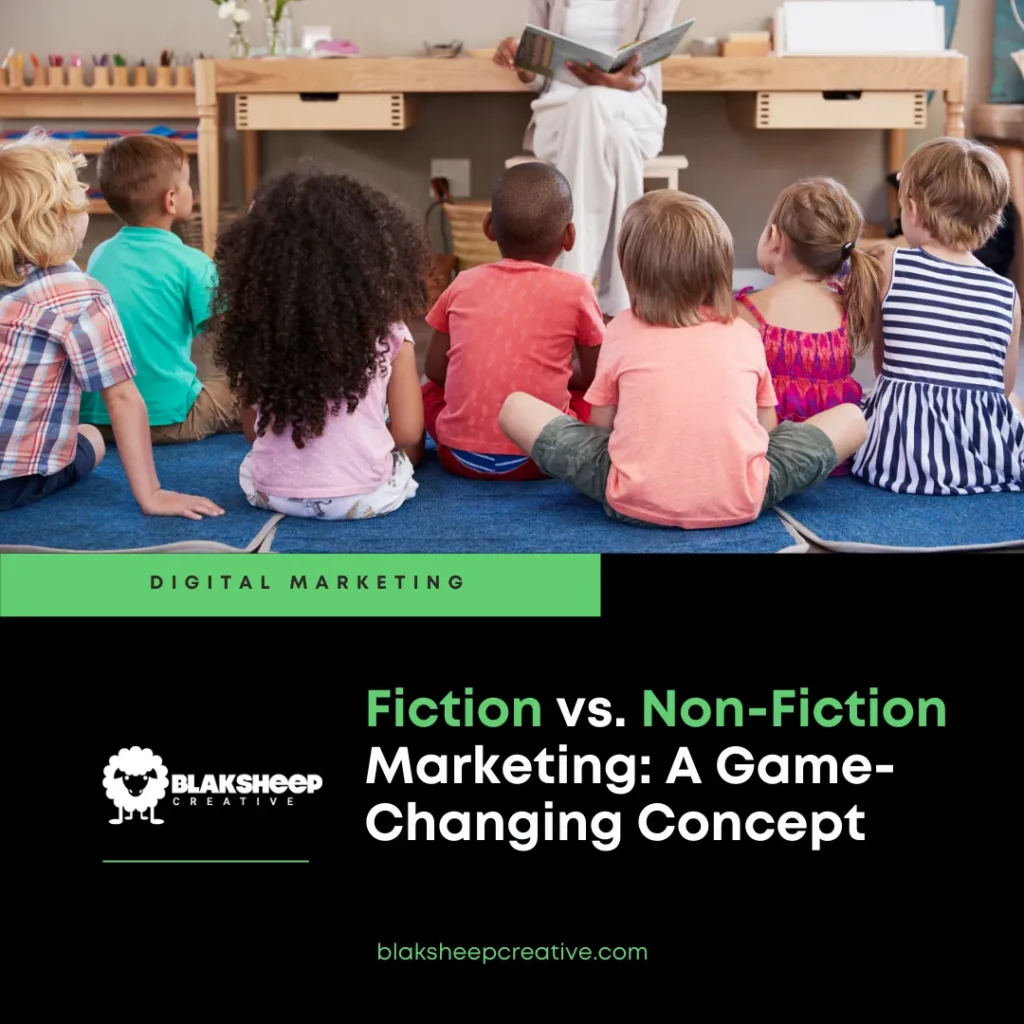What is Fiction Marketing and Why It Fails
Recently, I was reading an article by Kevin Geary, and it stopped me in my tracks. He broke down the difference between Fiction and Non-Fiction Marketing, and it felt like he’d put words to something so many of us experience in this industry but rarely articulate. This concept could completely reshape how you approach campaigns if you’re a marketer.
Let’s start with Fiction Marketing, a term used to describe a common marketing approach where a product or service lacks substance, forcing marketers to rely on exaggerated or fabricated stories to attract attention. On the other hand, Non-Fiction Marketing is a strategy that focuses on telling real, impactful stories about a product or service’s genuine value.
Fiction Marketing: The Short-Term Strategy That Sells Consumers Short
Fiction Marketing might feel like an easy win—it grabs attention, creates intrigue, and makes a product sound revolutionary. But here’s the catch: it’s all smoke and mirrors.
How Fiction Marketing Sells the Consumer Short
Fiction Marketing relies on deception. While the stories may be entertaining, they ultimately mislead the consumer about the product or service’s actual value. Instead of focusing on meeting the consumer’s needs, Fiction Marketing often creates:
- Unrealistic Expectations: When the product doesn’t deliver, customers feel betrayed. This is the harsh reality of Fiction Marketing, where the consumer is left feeling disillusioned and let down.
- Short-Term Wins Over Long-Term Loyalty: You might get the sale, but at what cost? Disappointed customers won’t return, and worse, they’ll tell others.
- Broken Trust: Trust is the foundation of any successful marketing campaign, and Fiction Marketing erodes that quickly.
Why Fiction Marketing Fails
In today’s world, consumers are smarter and more skeptical than ever. They can spot a fabricated story a mile away. Add to that search engines prioritizing authenticity and engagement, and Fiction Marketing becomes a recipe for disaster.
Fiction might sell a product once but won’t build relationships, loyalty, or sustainable growth.
The Power of Non-Fiction Marketing for Authentic Storytelling
Nonfiction marketing focuses on telling real, impactful stories. By highlighting a product or service’s genuine value, it resonates with audiences and delivers lasting results.
Example of Non-Fiction Marketing
A landscaping company with sustainable practices might share stories about:
- Using eco-friendly techniques to preserve natural beauty.
- The founder’s mission is to create greener neighborhoods.
This storytelling approach builds trust and aligns perfectly with search engine algorithms that prioritize user-focused content.
Why Non-Fiction Marketing Drives SEO Success
You might wonder, “How does authenticity actually help with SEO?” The answer lies in how search engines and audiences interact with your content. Non-fiction marketing creates genuine engagement, which wins over readers and signals to search engines that your content is trustworthy and valuable. Let’s break it down.
Higher User Engagement
Authentic stories encourage readers to spend more time on your website, which signals to search engines that your content is valuable.
Improved Credibility and Trust
Audiences are more likely to trust brands that share genuine experiences and solutions. This credibility translates to higher conversion rates and loyal customers.
SEO-Friendly Content
Search engines prioritize meaningful, well-written content. By focusing on authenticity, you naturally improve your rankings.
Kevin’s Non-Fiction Marketing Insights
Kevin’s concept revolutionizes marketing by encouraging honesty and authenticity. He believes that marketing becomes easier when you start with a strong foundation:
- Valuable products/services that solve real problems.
- Pricing alignment that meets customer expectations.
- Unique offerings that reduce competition.
When these elements are in place, storytelling becomes about amplifying the truth—not inventing it.
How to Avoid the Fiction Marketing Trap
Falling into the Fiction Marketing trap is easier than you think, especially when working with uninspiring products or competitive markets. But here’s the good news: escaping it is entirely possible. By focusing on authenticity and guiding your clients to improve their offerings, you can build honest and effective campaigns. Here’s how to do it.
Step 1: Build a Strong Foundation
Start with a product or service that’s genuinely unique, impactful, and aligned with customer needs.
Step 2: Craft a Compelling Story
Highlight the “why” behind your brand. What inspired its creation? What problems does it solve?
Step 3: Consult Instead of Covering Up
If a product feels too generic, work with the client to add value. As Kevin Geary says, “Don’t put lipstick on a pig. Transform it into something remarkable.”
Step 4: Focus on Authenticity
Engage audiences with real stories about how your product or service improves lives. Authenticity leads to stronger trust and better SEO performance.
Why Fiction Marketing is a Disservice to Marketers, Too
Fiction Marketing hurts consumers and undermines the work we do as marketers. Creating a compelling campaign should be about amplifying a brand’s truth, not fabricating stories to mask flaws.
The Cost to Marketers
- Creative Burnout: Constantly spinning fiction is exhausting and uninspiring.
- Reputation Damage: When a campaign’s promises fall flat, it’s not just the client’s reputation at stake—it’s yours, too.
- Missed Opportunities: Fiction Marketing prevents you from helping clients build better, more meaningful offerings.
How Non-Fiction Marketing Builds Long-Term Success
Kevin’s article reminded me how often marketers fall into the trap of Fiction Marketing. It might bring a quick boost, but it’s not sustainable. Non-fiction marketing, on the other hand, builds real trust, engages your audience, and creates lasting success. It’s a beacon of hope in the often turbulent world of marketing.
If you’ve been struggling to gain traction with your campaigns, take a step back and ask: Are you marketing fiction or telling a real, meaningful story? As Kevin’s insights show, everything else falls into place when you focus on authenticity. It’s a powerful inspiration for all marketers.
Ready to elevate your marketing with authentic storytelling? Discover how BlakSheep Creative’s Digital Marketing Services can help your business build trust, drive engagement, and achieve long-term success. Explore our services and start your transformation today!



